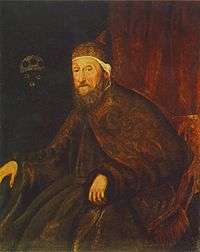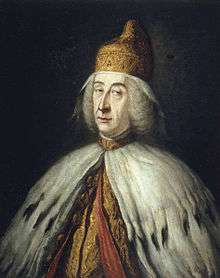Loredan

The family of Loredan is a noble family of the Republic of Venice.
History
The Loredan are a patrician family of Venice, dating back to the 12th century and occupying hereditary seats on the Great Council since the Serrata del Maggior Consiglio of 1297. A legend, more than facts, traced them back to the Mainardi family. The name is said to derive from Laureati, Lauretani because of their ancestors' historical glory. The branch of Santo Stefano, Venice ended with Andrea di Girolamo Loredan in 1750. The branch of San Vio (with the Palazzo Loredan Cini at Campo San Vio) still exists today.
Careers
Alvise Loredan (1393–1466) was a Venetian politician and commander of the fleet. Giacomo (Jacobus) Loredan, 1396-1471, was elected Procuratore di San Marco de Citra in 1467. [1] Admiral Pietro Loredan (died 1439), a famous member of the family, achieved two great victories, against the two rivals for power in the Mediterranean: over the Ottoman Turks near Gallipoli in June 1416. and over the Republic of Genoa near Rapallo in 1431. His try at being elected Doge was unsuccessful in 1423: he was defeated by his lifelong rival Francesco Foscari. Loredan was named general of the republic in 1436 during a war with Mantua and was elected generalissimo in 1438, and was assassinated the following year.
Antonio Loredan (1420–1482) was a captain of Venetian-held Scutari and governor of Split, Albania Veneta, and a town in Morea. He is best known for the successful defense of Scutari in 1474.
Pietro Loredan was appointed captain of two Venetian galleys by Doge Nicolò Marcello in 1473-74.[2]
Tommaso Loredan was given a commission as captain of two Venetian galleys in 1490 by Doge Augustino Barbarigo.[3]
Further politicians were Giacomo Loredan (1396–1471), Giorgio Loredan (before 1404–1475), Antonio Loredan (1446–1514), Marco Loredan (1489–1557), Giovan Francesco Loredan (1607–1661), Francesco Loredan (1656–1715), ambassador to Vienna.
Among literary figures, Giovan Francesco Loredan (1607–1661) is remembered for the Accademia degli Incogniti that he founded in 1630 at the age of twenty-seven.
Doges of Venice
The family contributed three Doges: Leonardo Loredan (1501–1521), Pietro Loredan (1567–1570), and Francesco Loredan (1752–1762), of whom only the first truly set his mark on the history of Venice; the Portrait of Doge Leonardo Loredan by Giovanni Bellini (1501) makes his face familiar still.
-

Leonardo Loredan (1501–1521), Doge of Venice, by Giovanni Bellini, 1501
-

Doge Pietro Loredan (1567–1570), by Jacopo Tintoretto
-

Doge Francesco Loredan (1752–1762)
Palaces
The Palazzo Loredan dell'Ambasciatore on the Grand Canal derived its popular name as the residence of the ambassador of the Holy Roman Empire.
The great collector in the family was Andrea Loredan who constructed a palazzo on the Cannaregio to designs by Mauro Codussi; it was paid for by Doge Leonardo Loredan; it was bought in the eighteenth century by the Vendramin, and as the Ca' Loredan Vendramin Calergi is notable today for its association with Richard Wagner. The Palazzo Giustinian Loredan is still today owned by the family.
In the terraferma there are numerous Villas Loredan — at Strà on the Brenta Canal; at Paese, near Treviso, the villa painted by Francesco Guardi; at Asolo; at Sant'Urbano, near Padua. The domain of the Villa Loredan at Paese was planted with grapevines in the 1950s by Conte Pietro Loredan; the wine continues to be made under the label Conte Loredan Gasparini.[4]
-
.jpg)
Palace Laredan in Santa Marina
-

Ca' Vendramin Calergi on the Grand Canal, built for Andrea Loredan
-
2.jpg)
Palazzo Loredan in Campo S. Stefano
-
_(Sant'Urbano).jpg)
Villa Nani Loredan (Sant'Urbano)
Further items
In 1534, Venice ceded the town of Barban to the Loredan family, which had acquired it in an auction, as a heritable possession. The family made it their summer residence.
Notes
- ↑ Venice, Biblioteca del Museo Correr, ms. Classe III 13; see also Dizionario biografico degli italiani, 1960-.
- ↑ Commission of Doge Nicolò Marcello, 1473-74, in Venice, Museo Correr, ms. Classe III 43, document description and first page online at nuovabibliotecamanoscritta, http://www.nuovabibliotecamanoscritta.it/Generale/ricerca/AnteprimaManoscritto.html?codiceMan=44124&tipoRicerca=A&urlSearch=pagCorrente%3D7.0%26__checkbox_autografi%3Dtrue%26tipoRicerca%3DA%26tipo_corpo_codice%3D%26__checkbox_palinsesto%3Dtrue%26__checkbox_datati%3Dtrue%26tipo_parola%3DA%26responsabilita%3D%26data_da%3D%26__checkbox_immagini%3Dtrue%26data_a%3D%26linguaMan%3D0%26__checkbox_decorati%3Dtrue%26titolo%3D%26argomento%3D%26segnatura%3Dms.+Classe+III%26anticasegnatura%3D%26incipit%3D%26__checkbox_musicali%3Dtrue%26__checkbox_carteggio%3Dtrue%26codBiblioteca%3D0%26__checkbox_restauro%3Dtrue%26explicit%3D%26__checkbox_astampa%3Dtrue%26nome%3D%26parola%3D%26__checkbox_composito%3Dtrue%26language%3Dit%26ordinaDatazione%3Dfalse%26ordineInverso%3Dfalse&codice=&codiceDigital=
- ↑ Paris, Biblithèque Nationale de France, MS. Lat.4730.
- ↑ Conte Loredan Gasparini
.jpg)

.jpg)
.jpg)
.jpg)